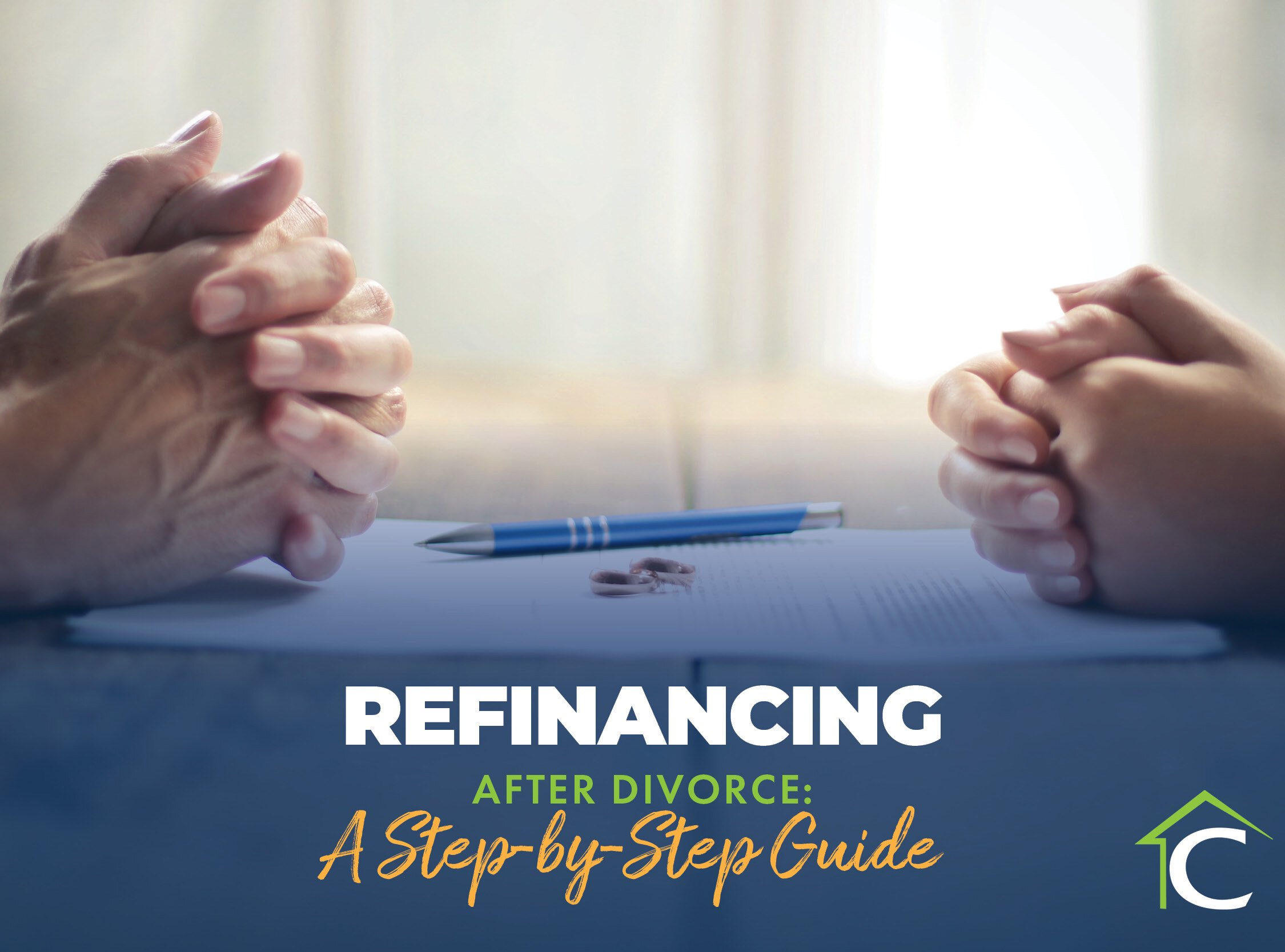When a marriage ends, untangling your financial life from your ex-spouse can be one of the most daunting aspects of the separation process.
Perhaps no financial decision looms larger than what to do with your shared home and mortgage. While some couples choose to sell and divide the proceeds, many situations call for one spouse to keep the property—which typically requires refinancing the mortgage.
"What happens to our mortgage?" is among the first questions many divorcing couples ask, yet the answer is rarely simple.
Refinancing after divorce involves navigating complex financial qualification requirements, understanding equity division, and coordinating legal processes—all during an emotionally taxing time.
At Contour Mortgage, our three decades of experience helping clients through post-divorce refinancing has given us unique insight into the challenges and solutions in this specialized area.
This comprehensive guide breaks down the refinancing process into manageable steps, helping you make informed decisions that protect your financial independence as you begin this new chapter.
Key Takeaways
- Joint mortgage responsibility continues: Your divorce decree doesn't override your mortgage contract; both parties remain legally responsible to the lender unless you refinance
- Financial qualification is critical: The spouse keeping the home must qualify for the new mortgage based solely on their own income and credit
- Multiple refinancing options exist: Cash-out refinance for equity buyouts, rate-and-term refinance for loan transfers, and, in some cases, mortgage assumption
- Documentation matters: Specific divorce-related documents are required beyond standard refinancing paperwork
- Timeline planning is essential: Refinancing after divorce typically takes 30-45 days, which should be factored into your divorce settlement timing
- Expert guidance is invaluable: Working with mortgage professionals experienced in divorce situations can expand your available options and prevent costly mistakes
Understanding Your Joint Mortgage Obligations After Divorce
When you and your spouse purchased a home together, you likely both signed the mortgage agreement, making you equally responsible for the debt in the eyes of your lender.
This joint mortgage obligation remains intact regardless of what your divorce decree states.
Important Facts to Understand
- Divorce decrees don't override mortgage contracts: Even if your divorce agreement says your ex-spouse will handle the mortgage payments, your lender still considers both parties legally responsible.
- Credit impact continues: Missed payments will affect both individuals' credit scores, even for the ex-spouse who no longer lives in the home.
- Future borrowing is affected: Remaining on a joint mortgage impacts your debt-to-income ratio for future loans, potentially limiting your ability to purchase another home.
- Legal liability persists: You remain legally tied to the mortgage until formal changes are made to the loan.
Why Refinancing Is Often the Best Solution After Divorce
For divorcing couples with a joint mortgage, refinancing offers the cleanest break financially.
Here's why it's typically recommended by financial experts:
Benefits of Refinancing After Divorce
- Complete financial separation: Removes all mortgage liability from the departing spouse
- Credit protection: Prevents future credit damage if the other party misses payments
- Increased borrowing capacity: Frees up the departing spouse's debt-to-income ratio for future home purchases
- Equity division: Provides a mechanism for the departing spouse to receive their share of home equity
- Peace of mind: Creates a clean break with clear financial boundaries
Assessing Your Financial Readiness for Post-Divorce Refinancing
Before proceeding with refinancing, it's essential to determine if the spouse keeping the home can qualify for a mortgage independently.
This step often reveals surprising financial realities that should be addressed early in the divorce process.
Key Financial Factors for Qualification
Income Requirements
The spouse retaining the home must demonstrate sufficient income to qualify for the new mortgage. Lenders typically look for:
- Stable employment history: Preferably two-plus years in the same field
- Verifiable income: Through tax returns, W-2s, and pay stubs
- Income stability: Consistent or increasing income over time
Something else to consider: Can alimony or child support count toward income qualification? Yes, but only if it meets specific requirements. Most lenders require:
- Support payments established for at least three to six months
- Documentation of consistent payment history
- Court-ordered payments scheduled to continue for at least three years
Credit Score Considerations
Divorce often impacts credit scores through:
- Joint accounts with missed payments
- Increased credit utilization during separation
- New credit inquiries for separate accounts
For refinancing after divorce, most conventional loans require a minimum credit score of 620, though better rates become available above 720. FHA loans may offer more flexibility with scores as low as 580.
Debt-to-Income Ratio
Lenders typically require a debt-to-income (DTI) ratio below 43%, though some loan programs allow up to 50%. This ratio compares your monthly debt payments to your gross monthly income.
Pro tip: If your DTI ratio is too high for conventional refinancing, consider an FHA streamline refinance if you currently have an FHA loan, as these often have more flexible DTI requirements.
Step 1: Gathering Essential Documentation
Refinancing after divorce requires specific documentation beyond standard mortgage paperwork. Being organized from the start will streamline the process significantly.
Documents Checklist for Post-Divorce Refinancing
Standard Refinancing Documents
- Last two to three years of tax returns
- Recent pay stubs (last 30 days)
- Bank statements (last two to three months)
- Investment account statements
- Current mortgage statements
- Homeowners insurance policy
- Photo ID
Divorce-Specific Documentation
- Final divorce decree or settlement agreement
- Quitclaim deed (if already executed)
- Court-ordered property division documents
- Alimony or child support documentation (if using for income)
- Separation agreement (if divorce isn't finalized)
Planning tip: Create a dedicated folder for these documents early in your divorce process, as gathering them while emotions are running high can be challenging.
Step 2: Understanding Your Refinancing Options
Several refinancing approaches exist for divorcing couples, each with distinct advantages depending on your situation. Let's explore the most common options:
Cash-Out Refinance for Equity Buyouts
A cash-out refinance is one of the most popular options for divorcing couples when one spouse will keep the home. This approach:
- Creates a new loan for more than the current mortgage balance
- Provides cash at closing to pay the departing spouse their share of equity
- Establishes a completely new loan in only the remaining spouse's name
Example scenario: If your home is valued at $400,000 with a remaining mortgage of $250,000, there's $150,000 in equity. If you're dividing assets equally, the spouse keeping the home would need to pay $75,000 to the departing spouse. A cash-out refinance for $325,000 ($250,000 existing mortgage + $75,000 equity buyout) would provide the necessary funds.
Rate-and-Term Refinance
If the spouse keeping the home already has sufficient assets to buy out the departing spouse's equity share, a simple rate-and-term refinance might be preferable. This option:
- Creates a new loan for approximately the same amount as the current mortgage
- Typically offers better rates than cash-out refinances
- Removes the departing spouse from the loan
- May allow for a higher loan-to-value ratio than cash-out refinances
FHA or VA Streamline Refinance Options
For those with existing government-backed loans, streamline refinance programs offer simplified processes:
- FHA Streamline Refinance: If you have an FHA loan and have been making the full payment yourself for at least six months, you may qualify to remove a spouse without income verification.
- VA Interest Rate Reduction Refinance Loan (IRRRL): Veterans with VA loans may use the streamline option, though only the eligible veteran can remain on the loan.
Did you know? Some government loan programs offer assumption options that might be faster than refinancing in certain situations. Contact our team to explore if this might be right for your situation.
Step 3: Removing Your Ex-Spouse From the Mortgage & Title
Removing your ex-spouse from both the mortgage and property title involves two separate processes that should be carefully coordinated.
Mortgage Release of Liability
The refinance process will release your ex-spouse from mortgage liability through:
- Application for a new loan in only your name
- Underwriting approval based on your individual financial profile
- Closing on the new loan, which pays off and replaces the joint mortgage
- Receipt of a satisfaction letter for the original mortgage
Property Title Transfer With Quitclaim Deed
Separately from the mortgage, you'll need to address property ownership through the title:
- Prepare a quitclaim deed transferring your ex-spouse's interest to you
- Both parties sign the deed (usually with notarization)
- Record the deed with your county recorder's office
- Retain the recorded deed as proof of sole ownership
Important caution: Never execute a quitclaim deed before refinancing is complete. Doing so could leave your ex-spouse without ownership rights but still fully liable for the mortgage.
Post-Divorce Refinance Readiness Assessment
Answer these questions to evaluate your readiness to begin the refinancing process after divorce. Refinancing can help you remove an ex-spouse from your mortgage or explore better loan terms. This assessment will highlight areas to prepare before starting the process.
Step 4: Valuing Your Home & Determining Equity Division
Fairly dividing home equity starts with an accurate property valuation. This step often becomes contentious during divorce, so having clear methods established is important.
Home Valuation Methods
- Professional appraisal: The most accurate method, typically costing $300-$600
- Comparative market analysis (CMA): Performed by a real estate agent, often at no cost
- Online valuation tools: Less accurate but provide a starting point for discussions
- Agreed-upon value: Some couples agree on a value without formal appraisal
Calculating the Equity Split
Once you have a home value, the equity calculation is:
Home Value - Remaining Mortgage Balance = Total Equity
This equity is then divided according to your divorce agreement, which may not always be a 50/50 split. Factors that might affect the division include:
- Contributions to the down payment
- Improvements made by one spouse
- Duration of marriage
- Presence of separate property claims
- Regional property laws (community property vs. equitable distribution states)
Pro tip: If you're uncertain about fair market value, consider getting multiple valuation sources to reach a consensus.
Step 5: Identifying the Best Refinance Terms
Once you understand your needs and qualification status, it's time to explore specific loan options. At Contour Mortgage, we've helped countless divorced clients find optimal refinancing solutions.
Finding the Right Lender for Post-Divorce Refinancing
Look for lenders who:
- Have experience with divorce-related refinancing
- Offer competitive rates for your specific situation
- Provide clear communication throughout the process
- Understand the unique documentation requirements for divorce situations
Questions to Ask Your Lender
- Do you have experience with divorce-related refinancing?
- What documentation will you need specific to my divorce situation?
- Can alimony/child support be counted toward my income qualification?
- What are your timeline expectations for closing?
- Do you offer any special programs for divorced individuals?
Rate shopping tip: Multiple mortgage inquiries within a 14-45 day period count as a single inquiry on your credit report, so don't be afraid to shop around for the best rate.
Step 6: The Application & Approval Process
Once you've selected a lender, the formal application process begins. Understanding what to expect can reduce stress significantly.
Timeline Expectations
A typical post-divorce refinance takes 30-45 days from application to closing, including these key milestones:
- Application submission: 1 day
- Initial disclosure review: 3-5 days
- Document collection and verification: 1-2 weeks
- Underwriting: 1-2 weeks
- Conditional approval and clearing conditions: 1 week
- Final approval: 1-2 days
- Closing preparation: 3-5 days
- Closing: 1 day
Common Reasons for Delays or Denials
- Incomplete divorce documentation
- Income verification challenges
- Credit score issues
- Property valuation problems
- Title complications from the divorce
- Debt-to-income ratio exceeding limits
Step 7: Closing on Your Refinance
The closing process for a post-divorce refinance includes some unique considerations compared to standard refinancing.
What to Expect at Closing
- Signing location: Usually at a title company, attorney's office, or lender's office
- Time required: Typically one to two hours
- Required attendees: Only the spouse keeping the home (ex-spouse typically not present)
- Documentation: Bring photo ID, cashier's check for closing costs (if not rolled into loan), and any last-minute requested documents
Costs & Fees Breakdown
Refinancing typically involves several types of costs:
- Origination fees: Lenders charge these fees for processing your new loan, typically calculated as a percentage of your total loan amount
- Appraisal fee: Required to determine your property's current market value
- Credit report fee: Covers the cost of accessing your credit history
- Title search and insurance: Protects against ownership disputes and ensures clear property title
- Recording fees: Paid to your local government to officially record your new mortgage
- Prepaid items: May include property taxes, homeowners insurance, and prepaid interest
Money-saving tip: In some states, such as New York, a CEMA (Consolidation, Extension, and Modification Agreement) refinance can potentially reduce mortgage tax costs. Ask our team if this option applies to your situation.
What If You Can't Qualify for Refinancing?
If standard refinancing isn't immediately possible, several alternatives exist that might bridge the gap until refinancing becomes viable.
Alternative Options to Consider
Temporary Co-Ownership Agreements
Some couples create legally binding agreements to continue co-owning the property temporarily until:
- Children reach a certain age
- The housing market improves
- The remaining spouse's financial situation strengthens
- A predetermined date arrives
These agreements should clearly outline:
- Payment responsibilities
- Maintenance costs
- Decision-making authority
- Exit strategy
- Contingency plans for missed payments
Delayed Refinancing With Legal Protections
If refinancing needs to be delayed, protect yourself with:
- Credit monitoring services
- Detailed payment tracking systems
- Legal agreements with penalties for missed payments
- Regular credit report reviews
- Written refinancing timeline expectations
Selling as a Last Resort
Sometimes selling the home is the only viable option, particularly when:
- Neither spouse can afford the home individually
- The emotional attachment to the home creates ongoing conflict
- The property is significantly underwater
- Both parties need their equity share immediately
Planning insight: If you anticipate refinancing challenges, address them early in divorce negotiations rather than discovering them when refinancing deadlines approach.
Legal Considerations & Protections
Proper legal protection during the refinancing process is essential for both parties.
Divorce Decree Mortgage Provisions
Ensure your divorce decree includes specific language about:
- Clear refinancing deadlines with consequences for non-compliance
- Interim payment responsibilities until refinancing is complete
- Contingency plans if refinancing isn't approved
- Equity calculation methods and payment terms
- Protection for the departing spouse's credit and liability
- Process for handling repair costs during the transition period
When Legal Counsel Is Essential
Consider consulting an attorney when:
- Complex equity division is involved
- Refinancing deadlines need enforcement
- Quitclaim deed issues arise
- One party is uncooperative
- Mortgage assumption is being considered
- The property has significant appreciation or depreciation
Have your attorney review any co-ownership or delayed refinancing agreements before signing to ensure your interests are protected.
FAQs About Refinancing After Divorce
How long does the refinancing process take after divorce?
Refinancing after divorce typically takes 30-45 days from application to closing, though complex divorce situations may extend this timeline. Planning for 60 days from start to finish is prudent.
Can I use alimony or child support income to qualify for a refinance?
Yes, but most lenders require that payments have been established for at least 3-6 months with documentation of consistent payment, and the court-ordered payments must be scheduled to continue for at least three years.
What if my ex-spouse refuses to cooperate with the refinancing process?
If your divorce decree requires refinancing or cooperation, you can return to court for enforcement. Your attorney can file a motion for contempt or specific performance to compel cooperation.
How is home equity divided during a divorce refinance?
Equity division follows your divorce agreement, which may not always be 50/50. The calculation starts with current market value minus the remaining mortgage balance, then applies the agreed-upon division percentage.
Will refinancing after divorce hurt my credit score?
The credit inquiry and new loan will have a minor, temporary impact on your score. However, this is far outweighed by the benefit of removing the risk of credit damage from an ex-spouse missing payments on a joint mortgage.
What if neither of us can afford to keep the house after divorce?
If neither spouse can qualify for refinancing individually, selling the home and dividing proceeds is typically the cleanest solution. Alternative options include delayed refinancing with legal protections or temporary co-ownership agreements.
Can I refinance before the divorce is finalized?
While possible, refinancing before finalizing divorce is complicated. Most lenders prefer to see a final divorce decree, and refinancing prematurely can create complications in asset division negotiations.
What documents do I need from my divorce to refinance?
Essential documents include your final divorce decree, property settlement agreement, quitclaim deed (if executed), and any court orders regarding property division or support payments.
Get Expert Guidance From Contour Mortgage
Refinancing after divorce represents a critical step in rebuilding your financial independence.
At Contour Mortgage, our experienced loan officers provide personalized guidance for people navigating divorce and mortgage considerations. Since 1993, we've built a reputation for excellence, earning recognition as the Best Mortgage Company on Long Island multiple times.
We understand this challenging transition and offer supportive, knowledgeable assistance without judgment. Our team has deep expertise in:
- Refinancing to remove an ex-spouse from a mortgage
- Navigating equity buyouts through cash-out refinancing
- Evaluating qualification with post-divorce income structures
- Understanding how alimony or child support affects loan qualification
- Exploring government-backed loan options for divorce situations
Contact us today for a confidential consultation to discuss your specific situation. Our team has the expertise to help you make informed decisions during this important transition.
This article provides general information and shouldn't be construed as legal advice. Always consult with legal and financial professionals regarding your specific situation.

















